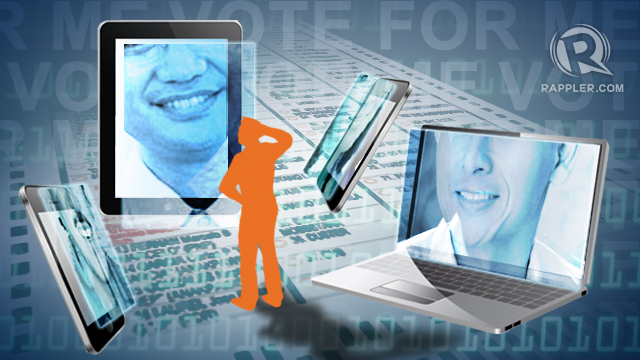SUMMARY
This is AI generated summarization, which may have errors. For context, always refer to the full article.

There is a gradual – but apparent – shift in the way aspiring public officials have been trying to win votes, and some have been quick on the draw.
Grand sorties, catchy jingles and ludicrous dance numbers still draw the masses in, but there is a growing number of candidates taking over the Internet. Some have caricatures of themselves going viral on Youtube. Some have been personally replying to tweets, profusely thanking those who posted kind words about the cross-posted family photo from Instagram. Some have been posting Facebook status messages, from simple greetings to official stances on national issues.
They have been making a point to spend a lot of time online simply because we do.
From digital dwellers to volatile volunteers
During the 2010 national elections, the bulk of social media traffic came from the youth. They were loud, volatile, and their energy infectious. Platforms such as Facebook and Twitter allowed their voices to be greatly amplified.
We have seen how the Pinoy netizens took to Facebook and Twitter to rally behind their chosen candidates. Both winning and losing candidates had very interesting campaign stories, but a good example would be the presidential campaign of former defense secretary Gibo Teodoro.
Teodoro’s campaign, apart from numerous on-ground sorties, was heavily dependent on social media. The idea to form a volunteer group came from fresh college graduate Michael Ong, who teamed up with lawyer and Lakas senatorial candidate Raul Lambino to get the ball rolling. Ong, along with a core group of youth leaders who believed in the ideals espoused by Teodoro, created a Facebook group called Green Team.
Ong, Lambino, youth leader Aaron de Leon, and several others organized local Green Team “chapters,” fusing the volatility of social media and the convenience of existing communities. Soon, the Green Team had several umbrella groups mobilizing in each location. Several smaller groups joined forces with the youth-driven Green Team, such as businessman Andrew Masigan’s G-Squad and GTX, a group of Teodoro’s fellow Xavier School alumni.
It gained the attention of then-Lakas head Francis Manglapus, and because of the massive publicity and mobilization both on-ground and online, the political party started to work closely with the volunteer groups.
Teodoro lost the presidential elections, but it was undeniable how social media helped boost his campaign, making him a national household name.
Setting parameters
To date, there are several who are making good use of their own accounts. Senatorial candidates JV Ejercito, Risa Hontiveros, and Chiz Escudero are very active on Twitter, gregariously engaging the public, sharing their advocacies, opinions, and even a glimpse into their lives.
Last election, public figures’ social networking accounts were mostly maintained by their staff or campaign volunteers. Such were used to drive their platforms across and mobilize volunteer units.
This campaign model was just a little past its infancy when it was used during the 2010 presidential elections, but clearly, its potential to drive critical mass did not escape the Commission on Elections.
The Comelec just recently held a discussion on online propaganda regulation. While the guidelines — as presented in Resolution No. 9615 — only target the more overt banner/pop-up ads, social networking accounts are let off the hook as they were deemed “free.” Netizens were invited to the discussion, with Chairman Sixto Brillantes personally asking them to “help monitor online campaign activity.”
With the established parameters still crude, politicians are hardly restricted from reaching out via social media. They can employ the services of the emerging digital marketing industry, which understands the sophistication involved in creating an effective and lasting online campaign.
Bypassing boundaries
Today is an age when anybody with Internet access can directly communicate with anyone — friend, foe, authority figure, or the general public. With the emergence of social media as a legit driving force in significant national events, the candidate who intends to embrace the medium is left more vulnerable to the questions and feedback of the voting public, as they are granted direct access.
At any given point in your social media history, a public figure must have tweeted you back, or at least retweeted you.
Extensive social media engagement used to just be something the youth is more inclined to do, especially by those who can’t seem to extricate themselves from communicating with their peers.
If this kind of online behavior is seemingly juvenile, why would aspiring officials emulate it? Why would they subject themselves to vulnerability?
Because the Internet, after all, is a vote-rich estate, populated with 30 million Filipinos. – Rappler.com
Disclosure: The writer was a PR and media relations volunteer for Gibo Teodoro’s campaign.
Add a comment
How does this make you feel?
There are no comments yet. Add your comment to start the conversation.